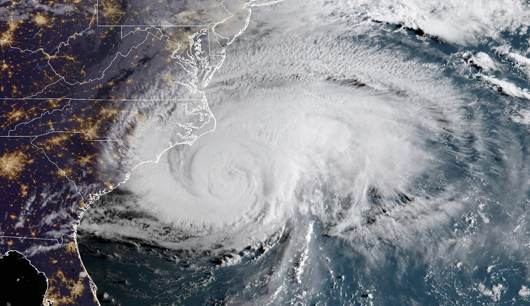Underwriting firm Chaucer has highlighted unpredictable patterns in weather, citing the fact that now some 16% of hurricanes, tropical storms and depressions hit northern US states, compared to just 12% 40 years ago.
 This is causing some challenges for insurance and reinsurance market interests, according to Chaucer, with increasing temperatures said to be making serious hurricanes even more severe, meaning that insurers must now reconsider the historical norms they use to model risk.
This is causing some challenges for insurance and reinsurance market interests, according to Chaucer, with increasing temperatures said to be making serious hurricanes even more severe, meaning that insurers must now reconsider the historical norms they use to model risk.
Interestingly though, Chaucer’s study found that the proportion of hurricanes that have hit southern states, like Florida and Georgia, as well as the Caribbean islands, has actually dropped from 60% to 54% in the past two decades.
States that fall between these two regions, so locations such as North and South Carolina, Virginia, Maryland and Delaware, are also being hit by proportionally more hurricanes, Chaucer’s analysis found.
With some 30% of all US hurricanes hitting the region between 2001-2020, compared to 24% between 1961-1980.
Chaucer’s study utilised NOAA data and looked at the locations in North America that are most commonly hit by hurricanes.
These areas were hit by hurricanes and other high-intensity storms come 533 times between 2001-2020, compared to just 430 times between 1981-2000, it found.
Chaucer concludes there is a “growing trend of hurricanes moving further north with greater ferocity.”
Which means that some locations, outside of traditional storm hotspots, are likely to be affected more often by hurricane and tropical storm impacts.
Importantly, Chaucer highlights that, “not all risk models used by insurers have adapted to,” these trends in hurricane activity.
Dana Foley, Head of Catastrophe Research at Chaucer commented, “Key aspects of these storms have become more uncertain with the changing climate, and this is driving a need for insurers to redefine their risk models.
“Whilst areas such a Florida have battled with hurricanes for years and learned to adapt to tropical storms, areas further north are likely to now see an increased intensity of hurricane activity that they may be unprepared for. This is something that insurers will need to factor in when assessing risk.”
Climate is seen as a factor, as scientists believe storms can be more intense, which can increase damage and also insurance and reinsurance market losses.
While climate models also suggest hurricanes are becoming slower-moving, while warmer sea temperatures also increase the amount of moisture they can potentially carry.
Chaucer says the trend towards higher-intensity, slower storms is increasing damage exposure for its clients, which is also relevant to reinsurance and ILS markets as their clients too are likely to bear part of that burden at least.
Foley added, “The most severe hurricanes are becoming even more severe. More heat in the system is a key driver of this and it is having other potentially significant impacts, such as extending the distance inland of strong winds after landfall. Many of the historical norms that we have relied on for modelling have to be revisited. As (Re)insurers, catastrophe model vendors, industry risk managers we all need to get a better handle on this.
“We can expect to see the trend of more severe hurricanes continue as long as the climate continues to warm. This will mean higher windspeeds and greater precipitation, which could ultimately lead to more property damage.”
 View all of our Artemis Live video interviews and subscribe to our podcast.
View all of our Artemis Live video interviews and subscribe to our podcast.
All of our Artemis Live insurance-linked securities (ILS), catastrophe bonds and reinsurance video content and video interviews can be accessed online.
Our Artemis Live podcast can be subscribed to using the typical podcast services providers, including Apple, Google, Spotify and more.






























